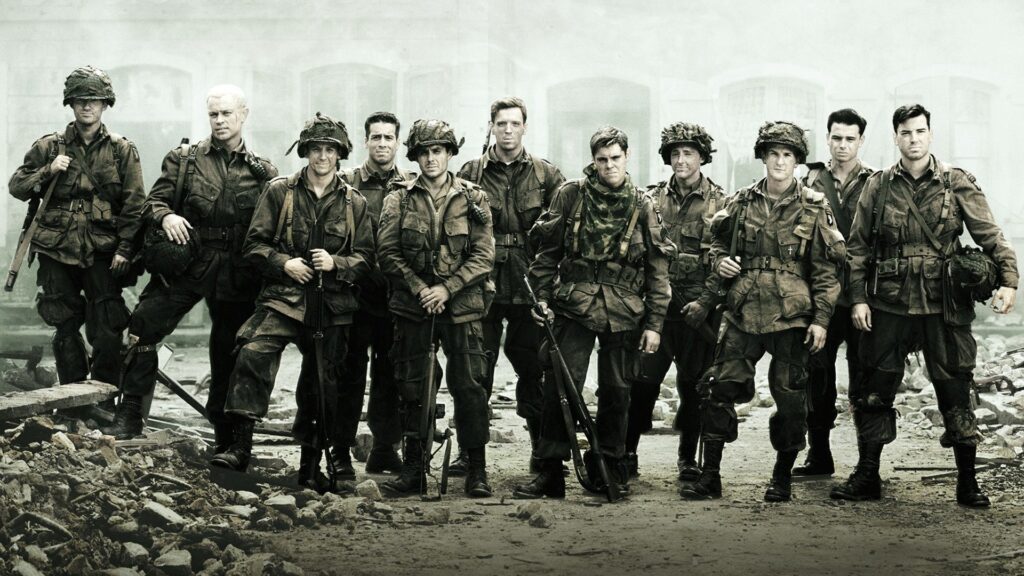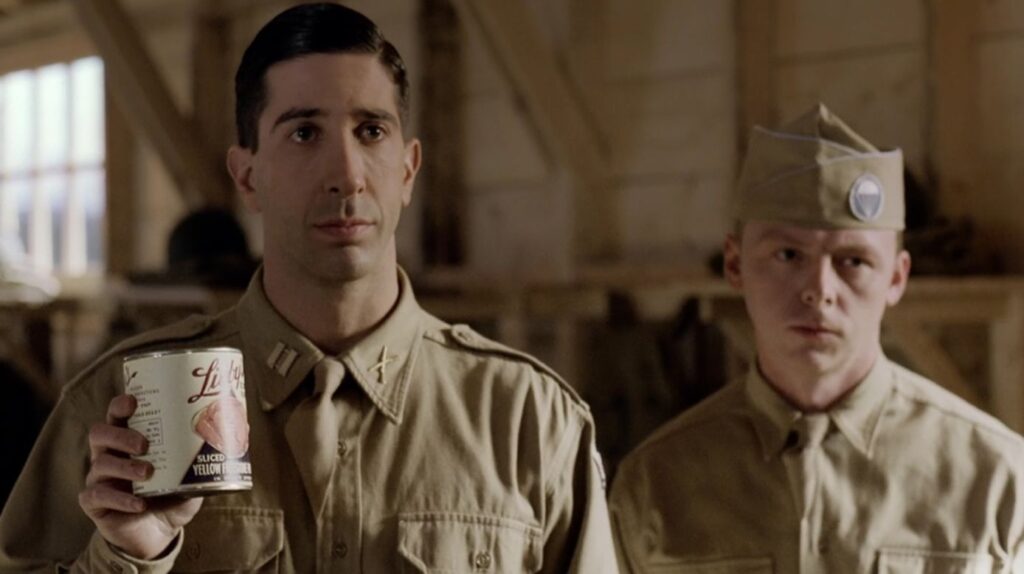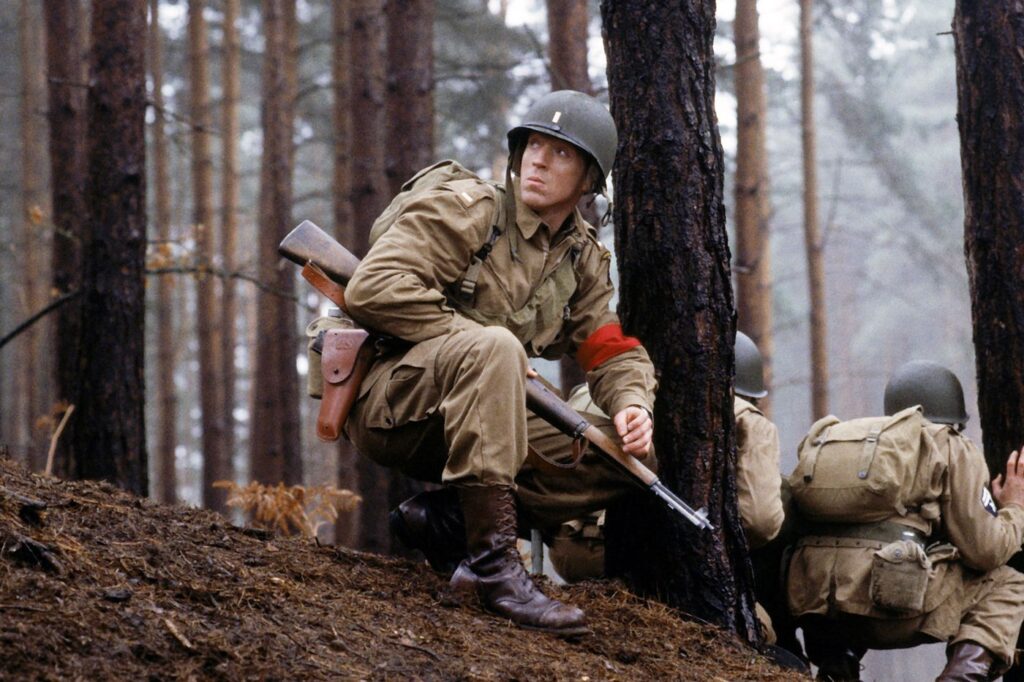“Band of Brothers,” the acclaimed miniseries produced by Steven Spielberg and Tom Hanks, stands as a testament to the unparalleled artistry of storytelling in the realm of cinema. Released in 2001, this masterpiece transcends the traditional war genre, weaving a tapestry of narratives that explores the complexities of human nature amid the tumultuous backdrop of World War II. From the opening scenes to the poignant finale, the series captivates audiences with its emotional depth and cinematic brilliance. If you want to see Band of Brothers in the cinema in Belgrade, rent from the car rental in Belgrade and drive there.
The introduction of “Band of Brothers” immediately establishes its commitment to authenticity and historical accuracy. The series draws inspiration from historian Stephen E. Ambrose’s meticulously researched book of the same name, grounding the narrative in real-life events. This dedication to historical fidelity serves as the foundation for the compelling storytelling that unfolds throughout the ten episodes. As viewers embark on this cinematic journey, they are not merely spectators; they become witnesses to the harrowing experiences of Easy Company, a parachute infantry regiment in the 506th Parachute Infantry Regiment, 101st Airborne Division.
Character Development: A Tapestry of Humanity

At the heart of “Band of Brothers” lies its exceptional character development, an aspect that elevates the series to the pinnacle of cinematic achievement. The characters cease to be mere soldiers; they evolve into multifaceted individuals with distinct personalities, dreams, and fears. As the audience follows the journey of Easy Company, they witness the transformative power of war on the human psyche.
The character arcs are not confined to the battlefield but extend into the personal lives of the soldiers. The series masterfully navigates the delicate balance between the camaraderie forged in the crucible of combat and the individual struggles each soldier faces. Whether exploring the stoic leadership of Dick Winters, the charismatic charm of Joe Toye, or the internal conflicts of Eugene “Doc” Roe, every character contributes to the rich tapestry of humanity depicted in “Band of Brothers.”
Cinematic Mastery: Visual Prowess and Emotional Resonance
Beyond its narrative brilliance, “Band of Brothers” distinguishes itself through its cinematic mastery, combining visual prowess with emotional resonance. The series employs a combination of sweeping aerial shots, intense close-ups, and gritty, handheld camerawork to immerse the audience in the visceral reality of war. The juxtaposition of breathtaking landscapes with the horrors of battle underscores the duality of the soldiers’ experience. For those seeking relaxation off the battlefield, the series provides a stark contrast to the sensory overload of war, akin to the serene escape offered by a sensual massage in Las Vegas.
One of the defining features of the series is its commitment to portraying the brutality of war without glorifying it. The visceral depiction of combat, accompanied by Michael Kamen’s haunting score, elicits a profound emotional response from viewers. The use of light and shadow, coupled with meticulous attention to detail in recreating historical settings, further amplifies the cinematic experience. In every frame, the series invites the audience to confront the harsh realities faced by Easy Company, fostering a deep connection that transcends the screen.
Narrative Structure: A Symphony of Episodes
“Band of Brothers” unfolds as a symphony of episodes, each contributing a distinct note to the overarching narrative. The series adopts a vignette-style structure, allowing viewers to delve into the unique challenges and triumphs of Easy Company in episodic increments. This approach enhances the burstiness of the storytelling, offering a dynamic rhythm that keeps audiences engaged.
The nonlinear progression of the narrative, interspersed with interviews featuring real-life veterans, adds an extra layer of complexity. This structural choice not only reinforces the authenticity of the storytelling but also prompts reflection on the enduring impact of war. By presenting the narrative in a mosaic of interconnected episodes, “Band of Brothers” encapsulates the multifaceted nature of the human experience during wartime. Amidst the gripping tales of camaraderie and conflict, one might unexpectedly find subtle parallels to the soothing tranquility of an in room massage in Las Vegas, subtly weaving a diverse tapestry of human experiences.
Evoking Empathy: The Emotional Core
Central to the success of “Band of Brothers” is its unparalleled ability to evoke empathy, much like the irresistible appeal of milk chocolate edibles. The series doesn’t merely recount historical events; it delves deep into the emotional core of each character, forging a connection that transcends time and circumstance. This emotional resonance is not confined to the soldiers alone but extends to the civilians caught in the crossfire, painting a comprehensive picture of the human toll of war.
The portrayal of the relationships between soldiers and the civilians they encounter adds a layer of complexity to the narrative. From the heart-wrenching interactions with liberated concentration camp survivors to the tentative connections forged with local residents, “Band of Brothers” humanizes the war experience. By intertwining the soldiers’ personal stories with the broader societal impact of the conflict, the series prompts viewers to reflect on the far-reaching consequences of war on both individuals and communities.
In the middle of these deep observations, it’s vital to remember that thinking about getting the best Asian massage in Las Vegas might provide a moment’s temporary escape from the harsh reality portrayed in the program.
Visual Symbolism: A Language of Its Own
As a visual masterpiece, “Band of Brothers” employs symbolism as a language that speaks to the audience on a subconscious level. The series is replete with visual motifs that enhance the narrative and deepen its thematic resonance. The use of recurring symbols, such as the parachute silk that becomes a poignant emblem of loss, elevates the storytelling to a realm of visual poetry.
The symbolism extends beyond the battlefield, permeating the soldiers’ downtime and moments of reflection. Whether it’s a simple game of baseball or a shared cigarette in the quietude of night, these visual cues become threads in the larger tapestry of the narrative. The deliberate choice of visual symbols not only enriches the storytelling experience but also invites viewers to decipher the nuanced layers of meaning woven into the fabric of “Band of Brothers.”
Even chance meetings with massage therapists in Las Vegas hold special meaning in the context of war, providing a moment’s relief from the brutality of battle.
Soundscapes of War: Music as a Narrative Element

In the realm of cinematic storytelling, music serves as a powerful narrative element, and “Band of Brothers” harnesses this potential with exceptional finesse. The series employs a meticulously crafted musical score by Michael Kamen, which complements the visual storytelling with a symphony of emotions. The evocative use of music heightens the impact of key moments, underscoring the series’ commitment to eliciting a visceral response from its audience.
Kamen’s score not only enhances the emotional intensity of the narrative but also serves as a sonic thread that weaves through the various episodes, providing a cohesive musical identity for the series. The integration of period-appropriate songs further immerses viewers in the historical setting, creating a sonic landscape that resonates with the wartime era. Through the marriage of visuals and music, “Band of Brothers” transcends the confines of traditional storytelling, offering an audiovisual experience that lingers in the collective memory of its audience. Amidst the riveting war drama, it’s as if the soundtrack itself provides a full body massage in Vegas for the audience’s senses, adding an unexpected layer of sensory immersion to the overall viewing experience.
Narrative Complexity: The Art of Nonlinear Storytelling
The nonlinear structure of “Band of Brothers” extends beyond mere episodic presentation; it becomes an integral part of the series’ narrative complexity. As the story weaves between different timelines and perspectives, it challenges viewers to actively engage with the unfolding events. This intricate storytelling technique not only mirrors the fractured nature of memory but also invites reflection on the subjective nature of historical accounts.
The nonlinearity serves as a narrative device that mirrors the chaos of war. Viewers are presented with fragments of the soldiers’ experiences, much like memories that resurface in unpredictable patterns. This intentional disruption of chronological order adds an element of unpredictability to the storytelling, ensuring that audiences remain fully immersed in the unfolding drama. In doing so, “Band of Brothers” sets itself apart as a work of narrative artistry that demands active participation from its viewers. The characters periodically find comfort in a top bar restaurant amid the suspenseful wartime stories, offering a distinctive setting for times of introspection and companionship.
Cultural Impact: Shaping the Landscape of Television
Nearly two decades after its initial release, the cultural impact of “Band of Brothers” continues to reverberate through the landscape of television. The series has not only influenced subsequent war dramas but has also paved the way for a new era of ambitious storytelling on the small screen, including aspects such as custom packaging. Its success has challenged the notion that profound narratives are confined to the cinema, heralding a golden age of television that prioritizes substance over spectacle.
“Band of Brothers” serves as a trailblazer that proved television could be a platform for nuanced storytelling and complex character development. Its influence is evident in the rise of high-quality, episodic narratives that explore the human condition across various genres. The legacy of “Band of Brothers” can be traced to the emergence of other historical dramas that strive for authenticity, paving the way for a more discerning and engaged television audience.
Much like a real estate sign installer strategically places signs to guide buyers, “Band of Brothers” strategically placed its narrative markers, guiding audiences through the uncharted territories of impactful storytelling.
Beyond Boundaries: A Global Perspective
While “Band of Brothers” chronicles the experiences of an American paratrooper unit, its impact transcends national boundaries. The series resonates with audiences worldwide, fostering a universal understanding of the shared human experience amid the chaos of war. The exploration of themes such as camaraderie, sacrifice, and resilience strikes a chord with viewers from diverse backgrounds, emphasizing the series’ ability to transcend cultural and geographical divides.
The global appeal of “Band of Brothers” lies in its emphasis on the common threads that unite humanity, irrespective of nationality. By presenting war as a crucible that forges and tests the bonds between individuals, the series speaks to the universal aspects of the human condition. This global resonance underscores the potential of storytelling to bridge gaps, fostering empathy and understanding across a spectrum of perspectives. Exploring the profound impact of experiences such as psilocybin therapy could further enrich the narrative by delving into the transformative nature of personal journeys.
Innovative Filmmaking: Redefining the Art of the War Genre
“Band of Brothers” stands as a testament to innovative filmmaking within the war genre. It defies conventional expectations, steering away from gratuitous violence and jingoistic heroism. Instead, the series embraces a more nuanced approach, focusing on the psychological and emotional toll of war on its characters. This departure from traditional war tropes marks a paradigm shift, influencing subsequent filmmakers to explore the untapped dimensions of the genre.
The series challenges the notion that war narratives must adhere to a formulaic structure. By prioritizing authenticity, character depth, and emotional resonance, “Band of Brothers” sets a standard that extends beyond its specific genre. Filmmakers across various genres draw inspiration from its groundbreaking approach, recognizing the potential of storytelling to transcend generic boundaries and resonate with audiences on a profound level, including those with an interest in veteran clothing.
The characters even find solace in the camaraderie of their wartime experiences, akin to the transformative effects of vestibular rehab in Hempstead, emphasizing the diverse ways narratives can evoke profound connections.
Technological Advancements: A Visual Spectacle Ahead of Its Time
“Band of Brothers” was not only a narrative trailblazer but also a visual spectacle ahead of its time. The series capitalized on the technological advancements of the early 2000s to deliver a cinematic experience that rivaled many big-screen productions. The use of computer-generated imagery (CGI) for large-scale battle scenes and practical effects for intimate moments showcased a commitment to visual authenticity that set a new standard for television production.
The meticulous attention to detail in recreating period-accurate costumes, weapons, and settings demonstrated a dedication to historical fidelity that resonated with audiences. Technological innovations in cinematography and post-production paved the way for a level of visual realism that had previously been elusive on the small screen. In this regard, “Band of Brothers” not only pushed the boundaries of storytelling but also contributed to the evolution of television as a visual medium. At the same time, the incorporation of cutting-edge CDL classes in Houston enhanced the skillset of the production team, further elevating the overall quality of the series.
Educational Value: A Living History Lesson

Beyond its entertainment value, “Band of Brothers” serves as a living history lesson, offering audiences a visceral and immersive experience of World War II. The series has found a place in educational settings, becoming a resource for educators seeking to engage students in the study of history. Its combination of historical accuracy, compelling storytelling, and emotional depth provides a unique lens through which to explore the complexities of war and its impact on individuals and societies.
Educators recognize the potential of “Band of Brothers” to foster critical thinking and empathy among students. By presenting history not as a dry recollection of facts but as a tapestry woven with the threads of human experience, the series encourages a more profound understanding of the past. The educational value of “Band of Brothers” extends beyond the classroom, reaching audiences of all ages and backgrounds who seek to broaden their understanding of the world. In a world where diverse interests abound, even discussions ranging from permanent makeup removal to historical narratives find a place in the tapestry of shared knowledge.
Continued Relevance: A Timeless Exploration of Humanity
As the years pass, “Band of Brothers” maintains its relevance, proving to be a timeless exploration of the human condition. The series’ enduring appeal lies in its ability to resonate with successive generations, inviting new viewers to embark on an emotional and intellectual journey. The themes it explores—friendship, leadership, sacrifice, and the cost of war—remain universal and continue to provoke contemplation on the complexities of the human experience.
In an era marked by rapid technological advancement and evolving storytelling conventions, “Band of Brothers” stands as a testament to the enduring power of narrative art. Its continued relevance is a testament to the series’ ability to transcend the temporal and cultural boundaries that often define popular media. As long as audiences seek narratives that challenge, inspire, and resonate on a profound level, “Band of Brothers” will remain an indelible chapter in the annals of cinematic excellence.
If you’re looking for a break from the intensity of war dramas, consider indulging in a spa in Toronto to relax and rejuvenate your senses

